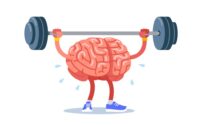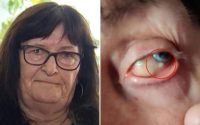‘Face blindness’ linked to COVID-19, alarming study says
After a bout of COVID-19, Annie couldn’t recognize her father’s face, even though she’s a part-time portrait artist.
“My dad’s voice came out of a stranger’s face,” the case study, identified only by her first name for privacy reasons, told researchers.
It’s now believed that Annie’s experience with “face blindness” is a result of long COVID-19, which has been linked to other neurological effects including brain fog, memory problems and a loss of smell and taste.
Annie, 28, is the first and only person known to have face blindness — what experts call prosopagnosia — as a result of COVID-19 infection, according to a new peer-reviewed Dartmouth College study published in the Cortex medical journal.
“Faces are like water in my head,” the customer service rep and part-time artist told doctors.
Face blindness can also be caused by a stroke, a traumatic brain injury or certain neurological diseases, according to the National Institute of Neurological Disorders and Stroke.
In some cases, it can be present at birth, and it may run in families.

The problem first become apparent for Annie when, two months after recovering from COVID-19, she met her family at a restaurant — but walked past them twice without recognizing them.
She now has to rely on voices to recognize the friends and family who are right in front of her.
She’s also living with navigational problems: Making her way around her favorite grocery store is now difficult, she has trouble finding her car in a parking lot and she sometimes realizes that she’s driving in the wrong direction on once-familiar routes.
“The combination of prosopagnosia and navigational deficits that Annie had is something that caught our attention because the two deficits often go hand-in-hand after somebody either has had brain damage or developmental deficits,” said Brad Duchaine of the Social Perception Lab at Dartmouth College in a statement.
Duchaine and other researchers published Annie’s case study in the journal Cortex. “Our study highlights the sorts of perceptual problems with face recognition and navigation that can be caused by COVID-19,” said Duchaine. “It’s something that people should be aware of, especially physicians and other health care professionals.”
Last year, President Joe Biden’s administration announced a long COVID-19 research push amid estimates that it may be affecting as many as one in three people who’ve had the coronavirus.
“The administration recognizes that the COVID-19 pandemic has resulted in new members of the disability community and has had a tremendous impact on people with disabilities,” the White House said in a statement at the time.
The initiative is focused on improving care and support, enhancing education and outreach, and advancing research, Health and Human Services Secretary Xavier Becerra said during a COVID-19 response team briefing.
“Long COVID is real and there is still so much we don’t know about it,” Becerra added. “Millions of Americans may be struggling with lingering health effects ranging from things that are easier to notice like trouble breathing or irregular heartbeat to less apparent but potentially serious conditions related to the brain or mental health.”


